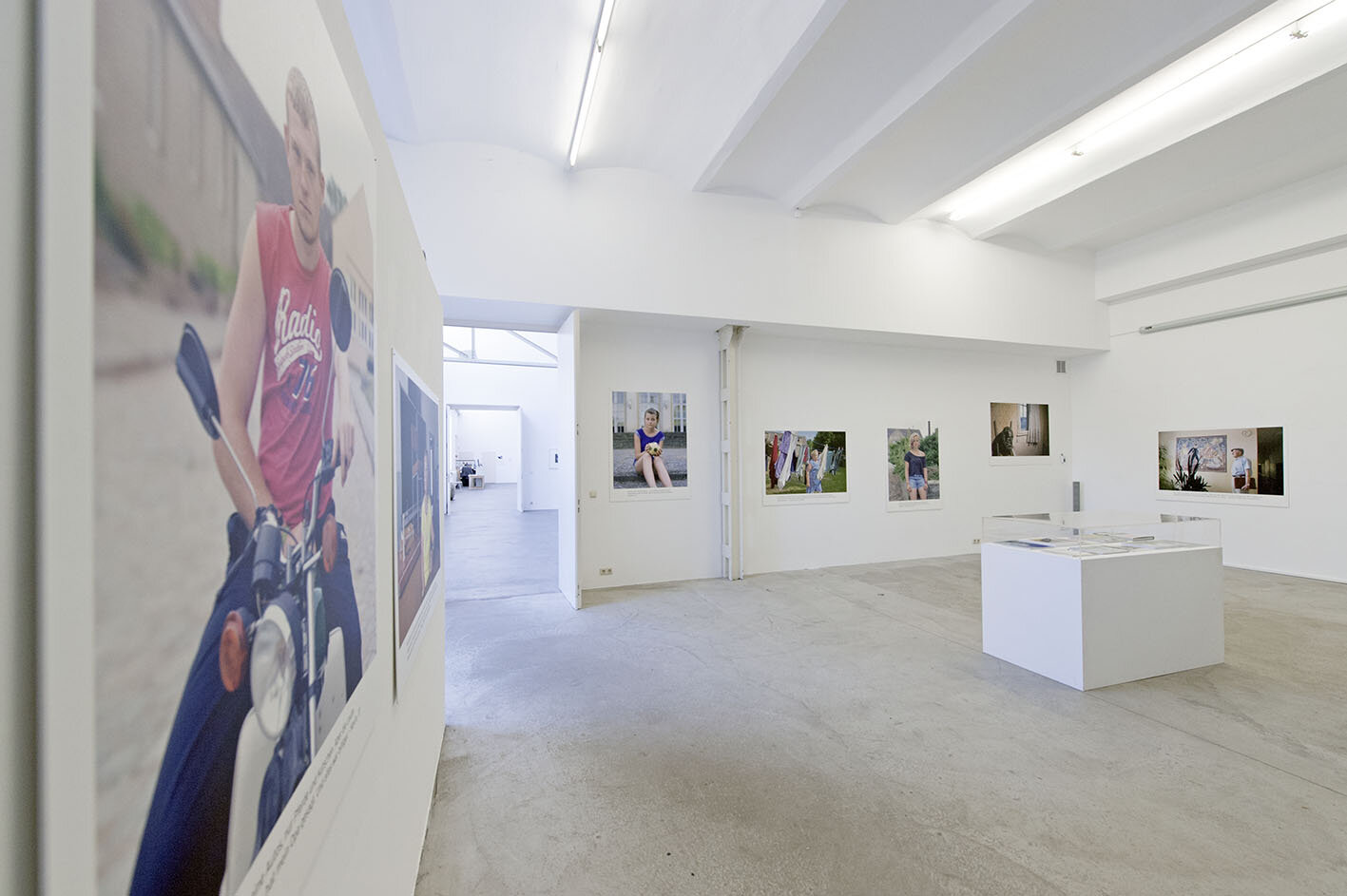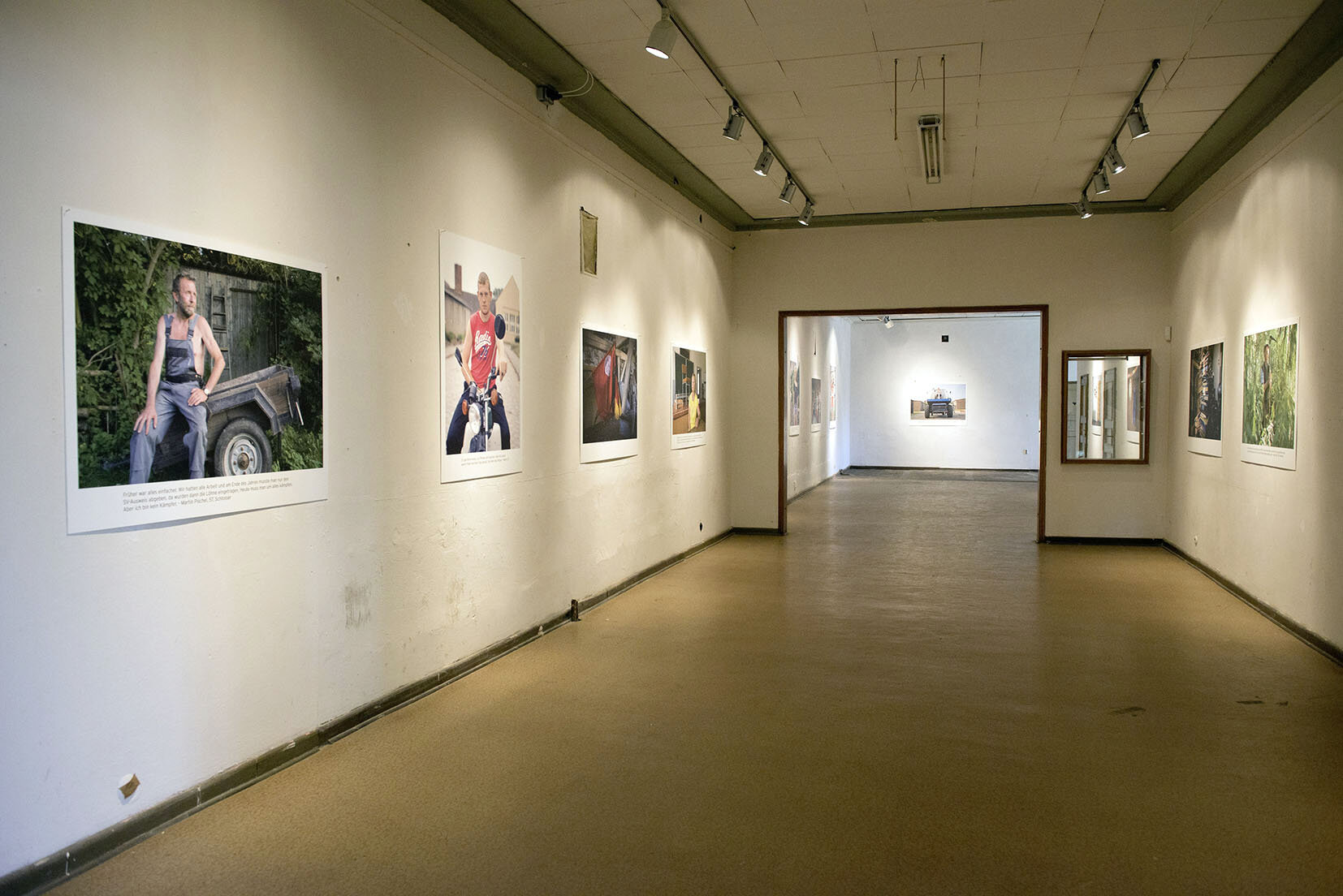Das sozialistische Musterdorf Mestlin
The socialist village of Mestlin
Das sozialistische Musterdorf Mestlin ist zwischen 1952 und 1957 entstanden. Ein paar Sommerwochen lang lebte Bettina Flitner in dem mecklenburgischen Dorf und fragte die Einwohnerinnen und Einwohner: »Was war die DDR für Dich?“ – 36-teilige Arbeit, hier eine Auswahl. Textreportage lesen
The socialist village Mestlin has been constructed between 1952 and 1957. For a few summer weeks Bettina Flitner lived in the village on the countryside of Mecklenburg Vorpommern and asked the inhabitants: “What do you remember of the GDR?” – 36-piece work, here a selection. Read reportage
Freie deutsche Jugend baut auf! Für eine bessere Zukunft bauen wir die Heimat auf!“ Wir hatten keinen Strom, ich hatte immer schwarze Nasenlöcher von der Petroleumlampe. Aber es war trotzdem eine schöne Zeit. – Ursula Hussel, 65, Arbeiter
‘Free German Youth, build on this! We build a better future for our homeland!’ We had no electricity; I always had black nostrils from the kerosene lamp. But it was still a good time. – Ursula Hussel, 65, worker
Speicher der LPG Mestlin
Garret of the cooperative Mestlin
Es gab keine Autos, nur Pferde und Kutschen. Aber die Leute waren freier, hat mein Opa gesagt. Und alles war billiger. – Kevin, 17, Schüler
There were no cars, only horses and carriages. But people were freer, my grandpa said. And everything was cheaper. – Kevin, 17, student
Trabant im Gebüsch in Mestlin
Trabant in the bushes in Mestlin
Mit 18 bin ich in die Partei eingetreten. Mein Großvater erfuhr es aus der Zeitung und hat geschimpft. Später bin ich Parteisekretär geworden. Rote Socke, wie man so sagt. Mein Mann hat sich immer geweigert. – Renate Frank, 64, Geschichtslehrerin
When I was 18, I became a member of the Party. My grandfather read about it in the newspaper and was very angry. Later, I became party secretary. A “red sock”, as they say. My husband always refused to take part. – Renate Frank, 64, history teacher
Schulbücher und Portrait von Erich Honecker auf dem Dachboden des Kulturpalastes
Schoolbooks and a portrait of former leader Erich Honecker in the attic of the Place of Culture.
Früher war alles einfacher. Wir hatten alle Arbeit und am Ende des Jahres musste man nur den SV-Ausweis abgeben, da wurden dann die Löhne eingetragen. Heute muss man um alles kämpfen. Aber ich bin kein Kämpfer." – Martin Pischel, 57, Schlosser
Back then, everything was easier. We all had work and, at the end of the year, you only had to hand in your social security card and they entered your wages. Nowadays, you have to fight for everything. But I’m not a fighter. – Martin Pischel, 57, locksmith
Da war was mit einer Mauer...Die DDR war abgetrennt von Deutschland. Und im Westen gab es Bananen und Schokolade. – Johanna, 14, Schülerin
There was something about a wall... The GDR was separated from Germany, and in the West they had bananas and chocolate. – Johanna, 14, student
Orden der DDR
Medals of the German Democratic Republic
Mein Vater sagte immer: “Man muss mit den Wölfen heulen.“ Da bin ich ihm zuliebe in die „Deutsch-sowjetische Freundschaft“ eingetreten. Mitmarschieren nur um den Schein zu wahren? Nee. Ich habe mich immer überall abseits gehalten. – Rudolf Ziegert, 57, Schlosser
My father always said: “You have to howl with the wolves.” To make him happy, I joined the “Society for German-Soviet Friendship”. But to march along just to keep up appearances? No way. I always keep myself at a distance. – Rudolf Ziegert, 57, locksmith
Plakat der DDR
Poster of the German Democratic Republik
Früher hat man 30 Prozent der Mitarbeiter durchgeschleppt. Aber das Betriebsklima war besser. Was haben wir für Feste gefeiert... Freiheit ist immer nur so viel wert, wie man Geld auf dem Konto hat. – Verena Nörenberg-Kolbow, 57, Leiterin der LPG
Earlier, 30 percent of the workers didn’t really contribute anything. But the atmosphere at work was much better then. The parties we used to have... Freedom is only worth as much as you have in your bank account. – Verena Nörenberg-Kolbow, 57, Head of the Agricultural Production Cooperative (LPG)
Partyraum in der LPG von Mestlin
Party room in the cooperative von Mestlin
Die hatten andere Klamotten, andere Musik. Die haben auf engstem Raum gewohnt. Und mussten sogar ihre Haare selber schneiden. – Alina, 13, Schülerin
They had different clothes and different music. They lived together in tiny apartments, and even had to cut their own hair. – Alina, 13, student
Wir haben geglaubt, dass wir das schaffen. Aber da war einfach zu viel Inkompetenz der Funktionäre. Prämiert wurde nicht Leistung, sondern Bekenntnis zur Sache. – Günther Peters, 87, Chemielehrer
We believed we could do it. But there was just too much incompetency among the functionaries. It wasn’t accomplishments that were honoured, but rather commitment to the cause. – Günther Peters, 87, chemistry teacher
Zusammengeklebter Kopf von Karl Marx im Kulturhaus Mestlin
Repaired head of Karl Marx in the Palace of Culture of Mestlin
Die DDR: Alt. Alte Kleidung, alte Autos, alte Frisuren. Und alte Filme in schwarz-weiß. Mit so ’ner blonden DDR-Schauspielerin. Marylin Monrow hieß die. – Liza, 16, Schülerin
The German Democratic Republic: Old. Old clothes, old cars, old hairstyles. And old black-and-white films. With some blonde GBR actress called Marylin Monroe.
– Liza, 16, student
Nach der Wende kamen die Farben dazu. Typberatung. Verkaufsgespräche. Das hatten wir ja vorher nicht. Ob man jetzt eher ein warmer Typ ist oder eher ein kalter. – Brigitte Kratzky, 63, Friseurin
After Reunification, all of sudden hair colouring was in. Individual consultation. Sales talk. We didn’t have that before. Whether you’re more of a warm type or maybe more cold. – Brigitte Kratzky, 63, hairdresser
Blick auf das Kulturhaus von Mestlin
View of the cultural palace von Mestlin
Mein Großvater war ein großer Kommunist. Ich aber war schon nicht mehr in der Partei.... Hier auf dem Schulhof gab es jeden Mittwoch Fahnenapell. „Pioniere seid bereit!“ rief der Pionierleiter. „Immer bereit!“ antworteten wir. – Manuela Sztob, Schäftebauer, 50
My grandfather was a big communist. But I was never a member of the Party... Here in the schoolyard, there was a flag raising ceremony every Wednesday. “Be prepared, Pioneers!” the Pioneer Leader called out. “Always prepared!” we answered. – Manuela Sztob, 50, Shoemaker
Ausstellungen I Exhibitions

Zeitgeschichtliches Forum Leipzig 2022

Kunsträume Michael Horbach Stiftung, Köln, 2015

Kunsträume Michael Horbach Stiftung, Köln, 2015

Kulturhaus Mestlin, 2014
Presse I press
“Es interessiert sie, was große politische Entwicklungen für den einzelnen Menschen bedeuten. Sie hat neun Bücher gemacht, ist in der Welt ausgestellt, mit Preisen und Auszeichnungen geehrt, eine große Künstlerin – das steht ihr nicht auf der Stirn geschrieben, sie trägt es auch nicht vor sich her. Wo immer sie die Szene betritt, ist sie eine wie du und ich. Ihre Fragen sind einfach. Jeder kann sie verstehen. »Ich stelle eigentlich immer nur die Fragen, die mich selbst interessieren«, sagt sie. Deshalb klappt es auch mit dem Dialog. So war es auch in Mestlin.” – Neues Deutschland
"She is interested in what major political developments mean for the individual. She has made nine books, is exhibited in the world, honored with prizes and awards, a great artist - that is not written on her forehead, nor does she wear it in front of her. Wherever she enters the scene, she is one like you and me. Her questions are simple. Everyone can understand them. "I really only ever ask the questions that interest me myself," she says. That's why it works out with the dialog. That was also the case in Mestlin.– Neues Deutschland
"Sie fuhr in das 1952 bis 1957 errichtete erste - und einzige - sozialistische Musterdorf der DDR um die heutigen Bewohner zu fotografieren und zu befragen… in dem Schemen wie “Marilyn Monroe, diese blonde DDR Schauspielerin”… herumspuken. Es ist ein solcher Witz, der Bettina Flitners sozialpolitische Serien auszeichnet."
– Frankfurter Allgemeine Zeitung
"She went to the first - and only - socialist model village in the GDR, built between 1952 and 1957, to photograph and interview today's residents... in which schemes like "Marilyn Monroe, that blonde GDR actress"... haunt. It is such wit that distinguishes Bettina Flitner's sociopolitical series." — Frankfurter Allgemeine Zeitung
“So ist eine innere reise zu all den Erfahrungen, die man die vergangenen 33 Jahre im Osten sammeln durfte, möglich. So stimulieren die atmosphärischen Fotos ein Versinken, das bis zur Sprachlosigkeit gehen kann. Oder wie es ein Gast auf einem Zettel so präzises und treffend formulierte:”Stille.” - Mitteldeutsche Zeitung
TV
NDR über die Ausstellung im Kulturhaus Mestlin.
German TV about the exhibition in the cultural center of Mestlin.
Die Arbeit entstand in Zusammenarbeit mit den Einwohnerinnen und Einwohnern von Mestlin. Sie wurde in EMMA und Cicero veröffentlicht. Textreportage lesen
The work has been realised together with the residents of Mestlin. It was first published in EMMA and Cicero Magazine. Read text






















